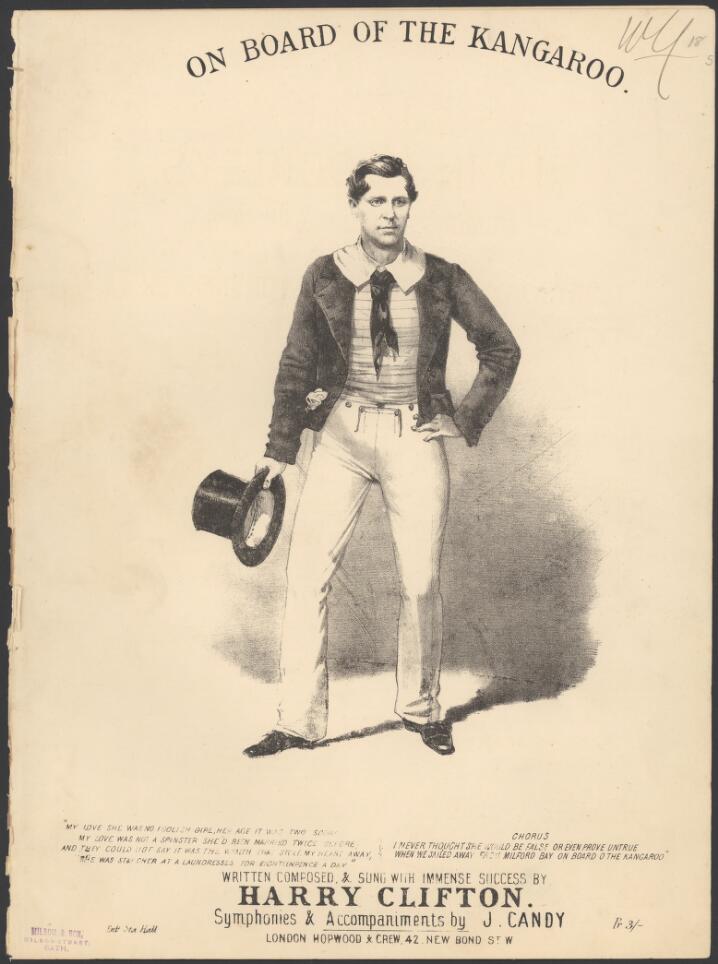On board o’ the Kangaroo
| AKA | Aboard the Kangaroo Milford Bay |
| Lyrics | Harry Clifton | Music | Harry Clifton | Roud | RN925 |
| Music Hall Performers | Harry Clifton |
| Folk performances | Source singers: Alexander Robb, 1906, Scotland Willie Mathieson, 1952, Aberdeenshire Scotland Elizabeth Cronin, 1954, Cork, Ireland Stanley Slade, yr? Bristol ,England, Harry Cox, 1953, Norfolk, England Alf Fuller, 1955?, Sydney, Australia Arthur Barron, 1906, Scotland Mr Smith, ca 1906?, Scotland Andrew Findlay, 1906, Scotland Modern versions Planxty, 1970,80s Nic Jones, Tony Rose |
From the sheet music c1865 Once I was a waterman man that liv'd at home at ease. Now I am a mariner and plough the angry seas. I thought I'd like seafarin' life, so bid my love "adoo" And shipped as Cook and Steward, boys, on board o' the 'Kangaroo'. I never thought she would prove false or ever prove untrue When we sailed away from Milford Bay on board o' the Kangaroo My love she was no foolish girl, her age it was two score My love she was no spinster, she'd been married twice before. And they could not say it was her wealth that stole me heart away; She was a starcher at a laundresses for eighteen pence a day. "Oh think of me, oh think of me," she mournfully did say, "When you are in a foreign land and carousin' far away. And take this lucky thruppenny bit, 'twill make you bear in mind That loving, faithful, trusting heart you leave in tears behind." "Cheer Up, cheer up, my own true love. Don't weep so bitterly," But she sobb'd and sigh'd, and choked and cried and couldn't say goodbye "I shan't be gone for very long, only months a few. When I does come back again, in course I'll marry you." Our vessel it was homeward bound from many a foreign shore And many a foreign present unto me love I bore. There was Tortoises from Tenerife and toys from Timbuktu A Chinese rat, a Bengal cat and a Bombay cockatoo. Paid off, I sought her dwellin' in the sub-bubs of the town An ancient dame upon the line was hangin' out a gown. "Where is me love? " "She's married sir, about six months ago To a smart young man that drives the van for Chaplin, Horne and Co". Farewell to dreams of married life! to soap, to suds and blue, To Glenfield Starch and Harpers Twelve Trees Washing Powder too! I'll seek some far and distant clime, I can no longer stay On some Chinese Hottingtot* I'll throw my self away!

Another comic song from Harry Clifton that is now firmly entrenched in traditional music in the English-speaking world. The sheet music has Clifton dressed as a sailor…
The earliest surviving sheet music was published in 1865, words credited to Harry Clifton and music to John Candy. Described in The Era as “a specimen of the modernised Dibdin lyric.” This is a reference to Charles Dibdin a writer who specialised in patriotic navy songs 50 or more years earlier. It seems to have been around at least a year earlier than 1865, as the review from July 1864 suggests.

According to later reports in The Era newspaper it was sung as part of the performance of a play called A Fight with Fate at the Surrey Theatre (London) in September 1864
The song features in a wide range of 19th-century broadsheets and song books It has been collected from source singers all over the world, but particularly in Scotland, perhaps reflecting the less selective ethos of the Greg-Duncan collection.
In modern times it has been recorded by Planxty, Nic Jones and Tony Rose, who seem to have got it from the singing of Elizabeth Cronin. Stan Hugill describes it as a capstan shanty, set to an Irish tune. There’s no reason to think that sailors would not adopt a Music Hall song to accompany their work , and I have heard versions with the chorus repeated after every two lines of verse, which makes it sound much more like the call and response of some shanties.
NB: “Hottentot” is a racist term first used by the Dutch and later adopted in Britain. It refers to the clicking sound which features in the language of Southern African Khoisan peoples. I tend to sing On some Chinese volcano I’ll throw myself away but perhaps I’m being overly dramatic…
Planxty introduce their interpretation:
Sources:
- Image, Lyrics and Sheet Music: National Library of Australia and personal collection.
- Mudcat thread
- Mainly Norfolk entry
- Hugill Seven Seas
- Peter Fryer Staying Power
- Worldcat entry